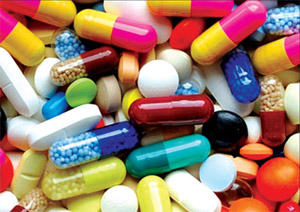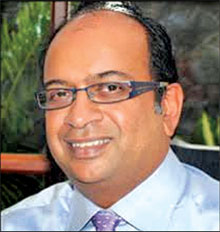'Fruitful R&D initiatives vital'
By Sanjeevi JAYASURIYA
 The local pharmaceutical industry continues to grow and with
regulations in place it could be a vibrant sector contributing to the
economy, Sri Lanka Chamber of the Pharmaceutical Industry (SLCPI)
President Vish Govindasamy told Sunday Observer Business. However,
fruitful research and development initiatives are necessary to improve
the current status of the industry, he said. The local pharmaceutical industry continues to grow and with
regulations in place it could be a vibrant sector contributing to the
economy, Sri Lanka Chamber of the Pharmaceutical Industry (SLCPI)
President Vish Govindasamy told Sunday Observer Business. However,
fruitful research and development initiatives are necessary to improve
the current status of the industry, he said.
Excerpts of the interview.
Q. As an Industry what is the progress it has made so far?
A. Starting from home remedies to 'corner drug store' where
decoctions and carminative mixtures were sold by pharmacists, the
industry has made great strides in research and development of new
chemical entities. Life expectancy has increased to seventies and
eighties in many countries, inspite of the increase in air pollution and
poor sanitation, mainly due to the treatment options and choices
provided by the industry which has dedicated itself to research and
development.
In the initial stages, like in any developing industry there were
excesses over the years, which resulted in a highly regulated industry
where the patients' welfare became the main focus.
|

Vish Govindasamy |
With the introduction of the compliance law, the pharmaceutical
industry has become one of the most regulated industries in the world.
It will take a few years for this benefit to be fully available in
developing countries due to the large generic manufacturing base,
however with Asian manufacturers entering the European and USA markets
they will be compelled to follow these regulations and we will have the
opportunity to enjoy the protection of compliance even in Asia. SLCPI
has already initiated a code of ethics which regulates the local
industry.
Overall the pharmaceutical industry which is regulated by the IFPMA
(International Federation of Pharmaceutical Manufacturers and
Associations), is now regarded with respect in the West for their
innovation and commitment to be in line with ethical guidelines of the
healthcare industry.
In Sri Lanka, after the SLCPI was set up, we have worked with the
Ministry of Health in a cordial manner. We have participated in all
deliberations at improving procedure to streamline delivery of
healthcare in relation to pharmaceuticals.
We were members of the NMDP (National Medicinal Drugs Policy)
Steering Committee and continue to be in the Technical Advisory
Committee of Ministry of Health (MoH) which makes policy decisions.
SLCPI officials participated in many regular and emergency forums as and
when the need arose.
From a handful of importers, the industry has progressed to
accommodate over 100 importers and market both original, branded
generics and generic pharmaceuticals of Sri Lanka. The private sector
can boast of a continuous supply of quality pharmaceuticals at low cost,
contrary to popular belief and anti pharma propaganda. The WHO and
Health Action International in their findings demonstrate that
pharmaceutical pricing in Sri Lanka is low and in many instances lower
than that in India giving prescribers and patients a healthy choice.
Q. What are the drawbacks for the industry's development?
A. In Sri Lanka, we are proud of the progress made by the
Ministry of Health. At the initial stage, all approvals for
pharmaceutical imports was the decision of one or two individuals and
for the past 30 years or more a definite progressive development had
taken place to ensure quality, efficacy and safety is accounted for in
all the imports to the country.
However much officials try to accommodate the work load of a growing
economy, they are not provided with adequate resources to meet the
increasing demand, which is the result of several approvals being needed
prior to importing pharmaceuticals.
The industry has discussed ways and means of reducing the workload by
eliminating duplication and we have had a good response from the MoH and
CDDA.
However, a lot more can be achieved together to ensure less occasions
of stock outs and a smooth flow of quality medicine to the country.
We also need to study the role of the local industry and pay more
attention to their grievances. If other Asian countries can export
pharmaceuticals, we also should be able to do so or at least attract
foreign principles to set up factories to service Asia.
India with all the labour unrest and the escalation of cost is fast
becoming an expensive destination to locate factories.
The constant negativity and 'industry bashing' that has taken place
over the decades and the ban on medical representatives entering
government hospitals has sent wrong signals to potential investors.
Not only have these factors kept away investors, a number of
research-based companies (i.e. Pfizer, Park-Davis) that had local
manufacturing facilities have sold out their facility and have left the
country altogether or have downgraded their presence in Sri Lanka to
mere agency operations.
The fact that the Universities of Sri Lanka did not offer a Pharmacy
Degree until recently, has also hampered the development of the local
industry as a pool of local expertise was lacking.
Q. In what areas is the industry lagging behind?
A. A new chemical entity takes a long time to register.
Sometimes our patients need to wait a long time to get the benefit of
new research. One can argue and say "let all the countries in the West
try and we can then import". However, from a patient's point of view if
one has a terminal illness and the remedy could prolong life for another
six months to one year, it is a life-time to the patient and the
relatives. We are allowed to get these on a user license which is
costly. A fast track method needs to be adopted for life savers.
We definitely need a knowledgeable team of healthcare professionals
who can assess the humanitarian needs of the patients and to facilitate
faster response. They also can regularly meet SLCPI officials to discuss
and facilitate the reduction of bottlenecks which cause delay and
unproductive time to the MOH and industry.
The industry has also failed to effectively self-regulate itself and
live up to the expectations of the public in terms of ethical behaviour
when it comes to its relationship with the medical profession.
Q. What is the way forward and suggestions for improvement?
A. Like in other developed and developing countries,
consultation with the industry body prior to making drastic changes is a
must to avoid unnecessary wastage of time and effort.
Streamlining the procurement process of the Government to ensure
adequate time is given for imports and planning to ensure availability.
We need to improve the lead time between a request for an order and the
time an order is placed, which is done mostly on a need basis now. Since
pharmaceuticals need adequate production, the procurement process time
to manufacture must be spaced out, we must respect each other's
constraints.
A regular update with the media to ensure we take the message to the
public without major deviations is also a must. People need to know the
truth about the industry and the services it provides rather than
negative reports generated without proper research.
Health is the most important aspect of a country, the best healthcare
professionals who understand the need, gravity and the enormity of each
aspect thoroughly, need to be appointed to key positions.
We observe that when one is getting accustomed to the operation, he
or she is transferred and we have to start all over with a new official.
Succession planning and continuity is of paramount importance. A
regular and proper dialogue will result in a better understanding for
the industry with government officials and the media. |



